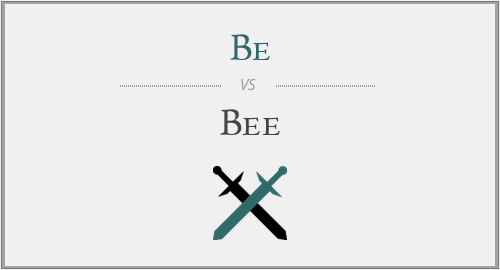The English language is a rich tapestry of words, each with its own unique meaning and purpose. Among these words, "be" and "bee" stand out as homophones, causing confusion due to their similar pronunciation. However, they hold distinct roles and significance within the language.
Verb: Be
"Be," functioning as a verb, is a fundamental element of English grammar. It serves as a linking verb that connects the subject of a sentence with its complement, describing a state of existence, identity, or condition. Consider the following examples:
- She wants to be a doctor when she grows up.
- They are trying to be more environmentally conscious.
- The goal is to be kind and compassionate to others.
Noun: Bee
"Bee," on the other hand, is a noun that refers to a flying insect known for its role in pollination and its production of honey. It is a crucial contributor to the ecosystem and agriculture. Observe the following examples:

- The bee buzzed around the garden, collecting nectar.
- Bees are essential for the pollination of many fruits and vegetables.
- The hive was abuzz with activity as the bees worked together.
It is important to distinguish between "be" and "bee", as they have vastly different meanings and functions. "Be" is a verb that conveys existence or a state of being, while "bee" is a noun representing a vital insect in nature and agriculture.
By grasping the nuances of "be" and "bee," you can communicate more effectively and accurately convey your intended messages within the intricate framework of the English language.




Have a discussion about this article with the community:
Report Comment
We're doing our best to make sure our content is useful, accurate and safe.
If by any chance you spot an inappropriate comment while navigating through our website please use this form to let us know, and we'll take care of it shortly.
Attachment
You need to be logged in to favorite.
Log In